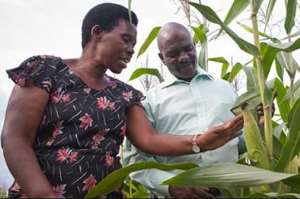
Accra, 31st January, 2014 - A research report by the United Nations University- Institute for Natural Resources in Africa (UNU-INRA) suggests that early planting in combination with irrigation are good and cost effective adaptation measures to reduce the impact of climate change on maize yields.
The study entitled: ―Modelling the Impact of Climate Change on Maize Yield under Rainfed Conditions in Sub-humid Ghana”, which was conducted by Dr. Benedicta Yayra Fosu-Mensah, a Visiting Scholar to the institute, posits that by the year 2050, precipitation is likely to decrease by 20 % with an increase in temperatures between 1.3 – 1.6 oC in Ghana. According to the report, the increase in temperature and decrease in precipitation are likely to cause a delay in the onset of the rainy season, making planting long season cultivars (often high yielding) interfere with minor season planting. This delay is likely to impact on maize yields.
The report indicates that delayed sowing under the condition of increase in temperatures and declining precipitation are likely to reduce maize yield by 28 - 35 %. This reduction could have serious implication for food security in the country. To mitigate the impact, the study proposes early planting as soon as conditions are favourable, construction of irrigation systems using local materials and the provision of storage facilities as adaptation measures to help improve food production and availability under climate change.
Explaining the relevance of the study, the Director of UNU-INRA, Dr. Elias Ayuk, states that, ―UNU-INRA's mandate is to enhance the capacity of researchers to undertake studies such as this one so as to inform policies on natural resource management for Africa's development‖.
He noted that the institute is one of the 15 research and training centres of the United Nations University. UNU-INRA aims to support research institutions and researchers to undertake studies in the area of natural resource management to inform policy formulation and implementation.
About UNU-INRA
UNU-INRA's work centres on Africa's two most important endowments — its human and natural resources. It aims at strengthening capacities at universities and other national institutions to conduct research and produce well-trained individuals with the ability to develop, adapt and disseminate technologies that promote the sustainable use of the continent's natural resources.
...UNU-INRA operates out of its main office at the University of Ghana. It has also established operating units (OUs) at the University of Cocody, Abidjan, Ivory Coast, University of Yaoundé I, Yaoundé, Cameroon, University of Zambia, Lusaka, Zambia, University of Namibia, Windhoek, Namibia, and Institute for Food Technology (ITA) of the Ministry of Mines and Industry in Dakar, Senegal, through which some of its major activities are carried.
Disclaimer
The views and opinions expressed in the research report are those of the author and do not necessarily reflect the official policy or position of the United Nations University-Institute for Natural Resources in Africa (UNU-INRA)
Website: www.inra.unu.edu, Email: [email protected]: Tel: +233 302 500396




 TUC tells informal sector employers to pay their employees the minimum wage
TUC tells informal sector employers to pay their employees the minimum wage
 Prof. Marfo urges good civilian-security relations to promote peace
Prof. Marfo urges good civilian-security relations to promote peace
 I was nearly jailed because of NPP; I’m still ‘pained’ — Hopeson Adorye
I was nearly jailed because of NPP; I’m still ‘pained’ — Hopeson Adorye
 Rising against NPP after being a minister for 15 years is a sin; God will judge ...
Rising against NPP after being a minister for 15 years is a sin; God will judge ...
 Cecilia Dapaah: Reasons behind AG’s advice to EOCO not grounded in law – Martin ...
Cecilia Dapaah: Reasons behind AG’s advice to EOCO not grounded in law – Martin ...
 NPP should have reported Kingsley Nyarko’s conduct to police – Inusah Fuseini
NPP should have reported Kingsley Nyarko’s conduct to police – Inusah Fuseini
 Akufo-Addo cuts sod for MIIF Technical Training Centre
Akufo-Addo cuts sod for MIIF Technical Training Centre
 NPP didn’t struggle to win Ejisu by-election – Samuel Ayeh-Paye
NPP didn’t struggle to win Ejisu by-election – Samuel Ayeh-Paye
 A/R: Achiase Chief arrested for acid attack on community members
A/R: Achiase Chief arrested for acid attack on community members
 Naa Ayemoede returns to school
Naa Ayemoede returns to school
